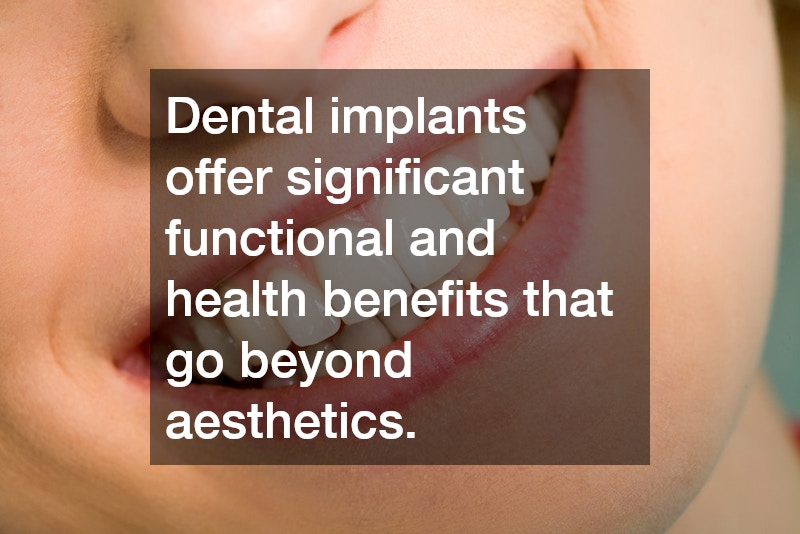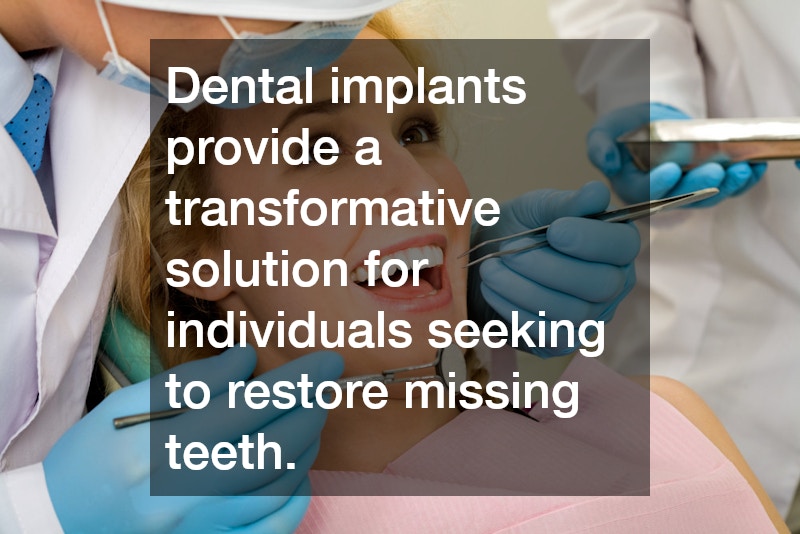Maintaining a healthy smile is about more than just appearance. Oral health directly impacts nutrition, speech, confidence, and overall wellness. Missing teeth or poorly functioning dentition can create challenges that extend beyond aesthetics, including difficulties with chewing, jaw alignment issues, and even reduced self-esteem. For individuals looking to restore their smiles and improve oral function, dental implants provide a long-term, reliable solution.
Unlike traditional dentures or bridges, dental implants integrate directly with the jawbone, offering stability, durability, and a natural appearance. Beyond the physical advantages, implants also support overall well-being, making everyday activities like eating, speaking, and smiling a source of confidence rather than discomfort. In this article, readers will gain actionable insights on the benefits of dental implants, how to choose qualified professionals, and strategies to maximize both functional and aesthetic outcomes.

Understanding Dental Implants and Their Role in Oral Health
Dental implants are surgically placed fixtures designed to replace missing teeth. They consist of a titanium or zirconia post embedded in the jawbone, which acts as a stable foundation for crowns, bridges, or overdentures. Over time, the implant fuses with the bone through a process called osseointegration, ensuring long-lasting stability and strength. Unlike traditional dentures, which can slip or cause irritation, dental implants provide a permanent solution that feels and functions like natural teeth. This makes them an ideal choice for those seeking a reliable, long-term restoration.
Benefits of dental implants:
-
Restore full chewing capacity: Individuals can enjoy a wide variety of foods without discomfort, supporting proper nutrition and digestion.
-
Maintain jawbone integrity: Implants stimulate the bone, preventing the resorption or weakening that often occurs with missing teeth.
-
Support adjacent teeth: By filling gaps, implants prevent other teeth from shifting out of alignment, which can reduce the risk of bite problems and additional dental issues.
-
Improve speech clarity: Ill-fitting dentures or gaps can cause slurred speech or difficulty pronouncing certain words. Implants eliminate these concerns.
-
Enhance self-confidence: A natural-looking smile improves social interactions and personal confidence, impacting both professional and personal life.
When seeking a dental implant service, it is crucial to consider the provider’s experience and the technology they use. Advanced services may include digital scanning, 3D imaging, and guided surgical placement to optimize precision. Some practices also offer computer-aided design and manufacturing (CAD/CAM) technology to craft custom crowns that perfectly match the patient’s natural teeth in color, shape, and size.
Patients should also inquire about post-operative support, recovery guidance, and follow-up care options. Some providers offer follow-up appointments to monitor osseointegration, ensuring the implant has properly fused with the bone and remains stable over time. Proper aftercare may include instructions for oral hygiene, diet adjustments, and the use of antibacterial rinses. Understanding warranty coverage and maintenance schedules further safeguards the patient’s investment, giving peace of mind that their new smile will remain healthy and functional for years to come.

Choosing the Right Professional for Your Dental Care
Selecting the right dental professional is one of the most important decisions for anyone considering implants. Cosmetic dentists focus on the aesthetic and functional outcomes of dental procedures, while a cosmetic dental office often offers advanced technology and a patient-focused environment. Choosing the right provider can significantly influence the success of the procedure, the comfort of the patient, and the longevity of the implants.
Tips for choosing a professional:
-
Verify credentials: Ensure the dentist is board-certified and has extensive experience with implant procedures. Membership in professional organizations, such as the American Academy of Cosmetic Dentistry or the American Academy of Implant Dentistry, often indicates ongoing education and commitment to high standards.
-
Evaluate experience: Ask how many implants they have placed and request before-and-after photos of previous patients. This helps gauge both technical skill and the quality of aesthetic outcomes. In addition, inquire about handling complex cases, such as patients with bone loss or prior dental work, which require advanced planning and expertise.
-
Assess office quality: Look for a clean, well-equipped office that uses modern imaging and surgical tools. Digital scanners, 3D imaging, and guided implant surgery enhance precision and reduce recovery time. An office that invests in technology demonstrates a commitment to patient outcomes.
-
Consider patient comfort: Inquire about sedation options, anxiety remedy techniques, and personalized treatment plans. Procedures like implant placement can be stressful, and a professional who prioritizes patient comfort can make the experience less intimidating. Ask about pain management, post-operative care, and follow-up support to ensure a smooth recovery.
-
Evaluate communication and support: A skilled dentist should explain the procedure, risks, and recovery process clearly. Staff who are responsive and informative can make scheduling, insurance navigation, and aftercare more seamless.
Choosing a cosmetic dentist from a reputable cosmetic dental office ensures that implants not only restore function but also blend seamlessly with natural teeth, delivering a confident, radiant smile. Furthermore, selecting a provider who emphasizes both aesthetics and patient care builds trust, reduces anxiety, and supports long-term oral health. Patients who feel informed and supported are more likely to follow aftercare recommendations, leading to better outcomes and satisfaction with their new smile.

Health and Functional Benefits of Dental Implants
Dental implants offer significant functional and health benefits that go beyond aesthetics. By replacing missing teeth, implants help restore proper chewing mechanics, improving digestion and nutrient absorption. Dentists emphasize the importance of preserving surrounding teeth, as implants do not require alteration of adjacent healthy teeth, unlike traditional bridges. This feature not only protects natural tooth structure but also contributes to long-term oral stability and overall dental health.
Key health benefits include:
-
Bone preservation: Implants stimulate the jawbone, preventing the deterioration that often follows tooth loss. Without stimulation from tooth roots, the jawbone can shrink over time, leading to changes in facial structure, premature aging, and additional oral health challenges. The dental implants benefits include serving as a natural replacement for tooth roots, preserving bone density, and maintaining facial structure.
-
Improved oral hygiene: Implants can be brushed and flossed like natural teeth, reducing the risk of decay or gum disease. Unlike bridges or partial dentures, implants do not create hard-to-clean spaces, making it easier to maintain healthy gums and prevent plaque buildup. Proper oral hygiene around implants is crucial to prevent peri-implantitis, an inflammation similar to gum disease that can compromise implant success.
-
Stability and comfort: Implants eliminate the discomfort associated with removable dentures, providing a secure fit that supports speech and confidence. Patients can eat, speak, and smile without worrying about slippage or irritation, which enhances both daily comfort and social confidence.
Maintenance tips recommended by dentists:
-
Brush and floss daily around implants and crowns, paying special attention to the gum line.
-
Schedule professional cleanings and check-ups every six months to monitor implant health and detect potential issues early.
-
Avoid habits that stress the implant, such as chewing ice, biting hard foods, or grinding teeth.
-
Use mouthguards during sports or nighttime teeth grinding to protect implants and surrounding teeth.
-
Maintain a balanced diet and avoid excessive sugary or acidic foods that could affect oral health.
In addition to these practical tips, patients should stay informed about any signs of complications, including swelling, tenderness, or loosening of the implant. Prompt consultation with a dental professional ensures timely intervention if issues arise. Through consistent care and monitoring, dental implants provide long-lasting benefits, preserving oral health, supporting facial structure, and enhancing overall quality of life. Over time, patients not only regain functional ability but also experience increased confidence and well-being, making implants a transformative solution for those with missing teeth.
Enhancing Aesthetics and Self-Confidence
One of the primary reasons patients pursue dental implants is the aesthetic improvement. A natural-looking implant restores the smile, fills gaps, and supports facial structure, preventing the sunken appearance that can occur with missing teeth. Cosmetic dentists specialize in shaping implants and crowns to match the surrounding dentition, ensuring seamless integration. Beyond matching color and shape, these professionals also consider bite alignment and symmetry, creating a smile that looks and functions naturally.
Strategies to maintain and enhance aesthetics:
-
Teeth whitening: Brightening surrounding teeth can complement the implant and create a uniform appearance. Whitening treatments, when coordinated with implant placement, ensure that the natural teeth and restorations blend harmoniously.
-
Consistent hygiene: Brushing, flossing, and regular professional cleanings prevent staining and inflammation. Daily care preserves both the implant and adjacent teeth, maintaining the overall visual appeal of the smile.
-
Cosmetic touch-ups: Periodic evaluations with a cosmetic dentist can help maintain the color and alignment of dental restorations. Minor adjustments or polishing can refresh the appearance and prevent gradual discoloration.
-
Diet considerations: Limiting foods and beverages that stain, such as coffee, tea, and red wine, helps keep implants looking natural and bright.
Restoring a complete, attractive smile has psychological benefits as well. Patients often experience increased self-confidence, improved social interactions, and reduced self-consciousness when speaking or eating in public. A well-designed smile can even influence perceptions in professional and personal settings, making patients feel more empowered. Additionally, when combined with other dental health practices, aesthetic implants contribute to a positive feedback loop of oral wellness, encouraging continued care and attention to hygiene, which reinforces both appearance and long-term dental health.
Dental Implant Materials and Supply Considerations
The longevity and success of a dental implant largely depend on the quality of materials and supplies used. Titanium remains the gold standard for posts due to its strength, biocompatibility, and ability to fuse with bone. Zirconia, a ceramic alternative, is ideal for patients seeking metal-free options.
Factors to consider regarding dental supplies:
-
FDA approval: Ensure the implant materials meet strict regulatory standards.
-
Compatibility: Materials should suit the patient’s jaw structure, bite pressure, and overall health.
-
Quality assurance: Reputable dental implant services source implants from established suppliers to guarantee safety and durability.
Choosing a provider that emphasizes high-quality dental supply products helps prevent complications, enhances outcomes, and supports the long-term success of implants.
Addressing Anxiety and Mental Health During Procedures
Dental procedures, particularly surgical interventions like implants, can cause anxiety for many patients. Addressing these concerns is essential for a smooth experience and positive recovery.
Anxiety remedy for managing dental procedures:
-
Breathing techniques: Deep, controlled breaths can reduce stress before and during procedures.
-
Meditation and mindfulness: Short sessions before appointments help calm the mind.
-
Sedation options: Oral or IV sedation can be discussed with the dentist to ensure patient comfort.
-
Mental health support: Discussing concerns with a mental health professional can provide coping strategies for particularly anxious individuals.
A calm, prepared patient is more likely to experience a successful procedure and faster recovery, making mental health considerations an integral part of implant planning.
Post-Procedure Care and Long-Term Maintenance
Proper post-procedure care is critical to maximize the benefits of dental implants. Following the dentist’s instructions ensures healing, prevents infection, and supports implant longevity.
Key steps for long-term success:
-
Maintain a regular oral hygiene routine: brush twice daily, floss gently around implants, and use antimicrobial rinses if recommended.
-
Schedule follow-up appointments to monitor healing and check for potential complications.
-
Avoid excessive force on implants; refrain from chewing hard foods or objects.
-
Maintain a healthy lifestyle with balanced nutrition and adequate hydration to support tissue and bone health.
By adhering to these practices, patients can enjoy their implants for decades, maintaining both functional and aesthetic benefits.
Educational Insights for Aspiring Dental Professionals
Understanding the broader dental care team is important for patients and future professionals alike. Pharmacy technician programs, for instance, provide education on medication management, anesthesia, and support roles that enhance surgical safety and patient outcomes.
Professional considerations for dental teams:
-
Training in anesthesia and patient monitoring ensures comfort and safety during procedures.
-
Knowledge of medications, such as antibiotics and pain management, supports optimal recovery.
-
Interdisciplinary collaboration improves procedural efficiency and patient satisfaction.
By appreciating the expertise of each team member, patients and aspiring dental professionals can make informed decisions and improve procedural outcomes.
Combining Function, Aesthetics, and Well-Being
The ultimate goal of dental implants is to restore function, aesthetics, and confidence. A holistic approach considers both physical and psychological aspects of oral health. Cosmetic dental offices often integrate patient-centered care, offering both restorative and cosmetic solutions alongside support for mental health and anxiety management.
Practical tips for integrating care:
-
Discuss aesthetic goals and functional needs with the dental office before beginning treatment.
-
Utilize mental health resources if anxiety or stress impacts the dental experience.
-
Follow a comprehensive maintenance schedule to preserve oral health and appearance.
-
Engage in regular communication with dental professionals for ongoing care guidance.
By balancing function, appearance, and emotional well-being, patients can achieve lasting satisfaction with their dental implants.
Dental implants provide a transformative solution for individuals seeking to restore missing teeth. By replacing lost teeth with durable, natural-looking implants, patients regain chewing efficiency, speech clarity, and facial support. Implants also enhance aesthetics, boosting self-confidence and social engagement. Beyond physical benefits, proper planning and care contribute to mental well-being, reducing anxiety and empowering patients to feel secure in their oral health.
From selecting a qualified cosmetic dentist or dental implant service to maintaining daily hygiene and attending follow-ups, every step supports the long-term success of implants. The integration of high-quality dental supplies, attention to mental health, and understanding the educational foundation of supporting staff ensures a comprehensive approach. For anyone looking to strengthen their smile and improve overall oral health, dental implants represent a reliable, enduring, and life-changing investment. By combining function, aesthetics, and emotional wellness, patients can enjoy a strong, healthy smile that lasts a lifetime.


